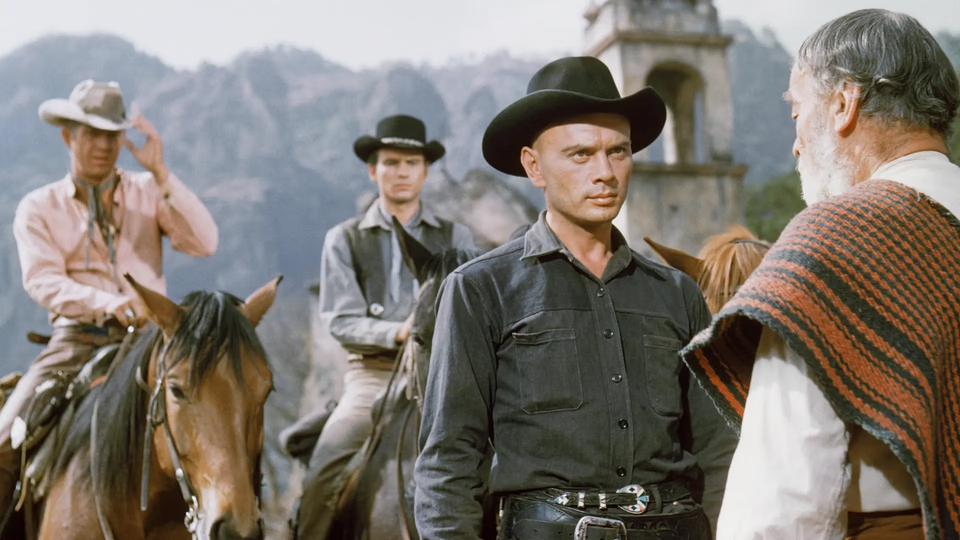The Magnificent Seven

Six are, indeed, magnificent, but Horst Buchholz seems plucked from a lesser movie.
A loose adaptation of Seven Samurai transplanted to the American Old West, the film opens with Eli Wallach leading a bandit gang extorting the residents of a small Mexican farming village. After Wallach rides out, the residents pool their meager belongings and head to town, hoping to buy guns to defend themselves.
In town, they chance upon a crowd watching a traveling salesman arguing with an undertaker. The salesman can’t understand the undertaker’s inability to bury a body.
The undertaker explains the body in question is Indian, and certain townsfolk object to having an Indian buried in the town cemetery. These objections led to threats, and the undertaker’s driver has quit.
“He’s prejudiced too, huh?” the salesman asks.
“If it comes to gettin’ his head blown off,” the undertaker replies.
“Well, get somebody else,” says the salesman.
“Nobody else will drive it! So here,” says the undertaker.
“Oh, hell! If that’s all that’s holding things up, I’ll drive the rig,” says Yul Brynner, stepping out of the crowd.
Another bystander, Steve McQueen, asks the man next to him to borrow his shotgun. “You’re more than welcome,” the man says, handing it over. McQueen climbs aboard the stage next to Brynner.
The pair begin the slow uphill crawl through the town to the cemetery. They speak few words as they dispatch a sniper and meet a token resistance of armed townsfolk at the cemetery gates. Brynner stares them down, and they relent.
Afterwards, Brynner and McQueen part ways, but before he goes, Brynner asks McQueen’s name.
“Make it Vin,” McQueen replies. “What’s yours?”
“Chris,” says Brynner.
This display prompts the villagers to approach Brynner, hoping he can help them buy guns.
“Nowadays, men are cheaper than guns,” says Brynner, convincing them to hire help.
McQueen joins first, after losing his last dollar at craps.
Next there’s Harry, an old friend of Brynner’s, who’s always looking for an angle, played by Brad Dexter.
Then comes Bernardo O’Reilly, a character who’s “Mexican on one side, Irish on the other,” played by Charles Bronson, with a neck as thick as the tree trunks he’s splitting to earn his keep when Brynner and McQueen approach him.
James Coburn follows as Britt, whose near wordless performance sees his piercing blue eyes do much of the talking.
Last comes Robert Vaughn as Lee, a wanted man harboring a secret shame.
These six are magnificent. When the film works best, such as the aforementioned stage scene, director John Sturges and the script let the six’s boundless charisma radiate from the screen. Such moments evoke Howard Hawks, and indeed, as the men arrive in the village and await Wallach’s return, the film settles into a hangout picture similar to Rio Bravo.
But about Buchholz.
He plays Chico, a would-be gunslinger who auditions for Brynner early, only for Brynner to sniff out his neophyte status and send him packing.
Humiliated, Buchholz turns up later, drunk, and does a lot of whiny emoting while Brynner and company ignore him with stoic silence.
But Buchholz proves persistent and soon joins the group en route to the village. Upon arriving, he gives another big emotive speech, chastising the farmers for not welcoming them. Later, he gives another speech when he discovers the farmers have hidden their women and children from the seven.
It’s the sort of sentimental melodrama Hawks always excised from his pictures. Sure, the villagers feel a little sappy begging for help, but as the lead villager, Jorge Martínez de Hoyos’ baggy eyes convey a sense of resolve beneath his pleading.
But Buchholz’s performance feels spliced from a different movie—an Actors Studio melodrama where he must convey the turmoil and frustration of growing up as a peasant farmer in every word and gesture. His delivers what feels like more dialogue than the other six combined. Much of it angst ridden or sulky. It doesn’t gel with the rest of the cast’s quiet meditation on the shrinking west and life as a hired gun.
None are here for justice, just money and the chance to prove himself against uneven odds. There’s a thematic through-line to Sam Peckinpah’s The Wild Bunch which dealt in similar themes of loyalty amid changing times, but grounded in a grittier reality, with Angel substituting for Buchholz’s character.
Still, The Magnificent Seven entertains. The wide-screen photography captures the majestic landscape and affords enough room for all seven to share the frame during the hangout scenes and the multitude of horses and bandits swarming the village during the climactic shootout.
Brynner leads this cast of leading men with practiced ease, convincing from the outset as an aging gunslinger wary of the his future. McQueen shines as a kindred spirit whose wordless reactions and body language prove a performance unto themselves.
As a western adventure, the film teeters on the precipice of greatness, building on Hawks and foreshadowing Peckinpah, but Buchholz’s performance anchors it in 1950s melodrama. Not a fatal flaw, just a frustrating one.